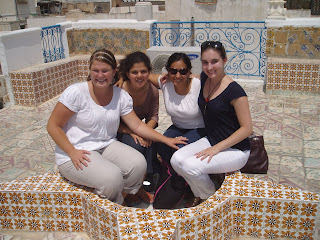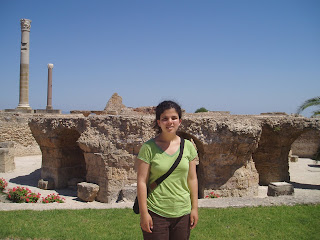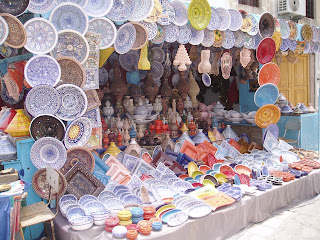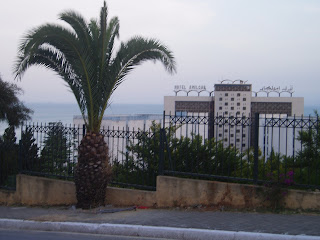****
I'm handwriting the first draft of this entry sitting outside of our house to the tune of the radio (maana, maana!), Catholics singing hymns next door and one of the biggest games of the football season happening at the stadium across from us. My host family is fluttering around me, moving mattresses and bedding outside to prepare for sleep and avoid the heat of the house, stopping occasionally to attempt to decode these English scribbles over my shoulder. It has been a long time since I've updated: life has been busy with road trips, school work and long walks around every corner of the city. I have had many adventures and many average days performing my all-too-easily made routine. I'll try to recap as best I can.

Two weekends ago, I went with a big group of Toubabs to the Lac Rose, Senegal's premiere tourist attraction: a pink lake about an hour outside of the city. We hired cabs for the day (a flat rate of just 20 CFA or about $40) and went out in a big caravan. To our disappointment, the lake wasn't pink at all! Apparently, it was too soon after l'hivernage (the rainy season that ended in September) for the lake to turn pink. Either way, it was nice to get out of the city. We still got to see the piles of salt they're extracting, take a nice walk along the shore, swim and float on the water, and some students even rode camels over the makeshift sand dunes.
The day before, my host family invited Morgane (the fellow exchange student that lives next door) and his hostbrother to have lunch with our family. My family prepared his favourite--this delicious Senegalese vermicelli with dates and raisins--and then we sat around for the rest of the day eating multiple desserts, drinking atayelle (the traditional super sweet mint green tea) and bissab juice. It was both delicious and painful. Luckily, that afternoon we played some basketball at a neighborhood court and went dancing in the night. It was my first time really going to a club and it was fun, although not my favourite thing. The club felt a little mafia-front esque with a lot of guys in suits and weird light up fuzzy wall paper on the walls, but the air-conditioning made the cover more than worth it.

The day before that, on Friday, I had a day literally worthy of the Amazing Race game show. I had received a package to pick up at the main post and decided to head down there after class, not at all knowing where it was or how to get there, but figuring I could just ask for directions along the way. As it turns out, I was doomed from the start: I miscommunicated with the first person that gave me directions and took the wrong bus. Not realizing it, I kept asking the bus driver to tell me when we reached a stop that wasn’t even on the line. He was really nice though and gave me a list of buses I could take to get there. I, however, disregarded them, because I wanted to walk. My trek then turned into me asking dozens of people. No one knew though, so in turn kept giving me directions to places/ people they thought would know. In an hour, I visited the British embassy, Ministre de L’interior, National Assembly, Musee de Dakar, and was led through the streets by a crippled man, only to find out I had been led to the wrong place: la poste financiere. Someone there offered to give me a ride (don’t worry—I wouldn’t have taken it), but was then informed that, because it was a Friday afternoon, the poste had closed at 1 in the afternoon. Given that it was 4:40, we were a bit too late.
It was probably one of my favorite days here so far though. I spent the rest of the afternoon walking through the Centre Ville. I happened across a beautiful cathedral, its fence lined with women selling Virgin Mary pendants, passed an international school with children of every colour dotting its sidewalk, French gliding off their tongues and totally oblivious to their differences. I even went to the Marche Sandaga (the biggest market in the city) and managed to not be harassed by over eager merchants. Now, you’ll be happy to know, I got my package. On Monday, I set out with a map and walked for about an hour, too stubborn to take a taxi or bus, through one of the liveliest neighborhoods of Dakar I’ve seen so far, the Medina. The sidewalks were crammed with vendors to the point that you had to walk in the streets and every intersection had a memorial for something or statue of someone chipped and missing limbs, a reminder of colonialism. It is also the neighborhood with the Grande Mosquee, an absolutely beautiful green and white mosque that takes up a block.
The weekend prior, I went on my mid-class phase field trip to Toubacouta with the other students in the program. Toubacouta is a small village very close to the Gambian border, so about 9 hours from Dakar. We set out on the unpaved roads in two buses, passing through many of the cities and towns where many of the people in the program will complete their internships. In Toubacouta we stayed at this nice eco-tourism hotel made up of thatched-roof huts, with monkeys climbing in the trees around the hotel and a POOL! We spent the five days we were there traveling around the area, visiting women’s microfinance groups, government officials, a public radio station, local health clinics, and listening to presentations about the environmental problems of the area. We planted mangroves, having to walk through mud up to our knees or higher. We visited a local village in the night and saw a dance and listened to traditional drumming in our honor. It was a great trip and so nice to get out of Dakar and learn that there is so much more to Senegal than the make-up of Dakar.
Oh, I also visited the Gambia!!

Well, considering it’s taken me so long to post this, another weekend has come and gone. I will post more when I have more time and access to the net. Take care!


























 We then visited the Great Mosque, an increadible, beautiful and huge structure that is one of the most important mosques of North Africa. This was my first time visiting a
We then visited the Great Mosque, an increadible, beautiful and huge structure that is one of the most important mosques of North Africa. This was my first time visiting a 

 Following the Great Mosque, we went to a smaller Berbere mosque. You can notice how beautiful the tiles of the mosque we
Following the Great Mosque, we went to a smaller Berbere mosque. You can notice how beautiful the tiles of the mosque we




 A view down the street from my school. Just so you know, it's really hard to do Sidi Bou Said justice with a camera.
A view down the street from my school. Just so you know, it's really hard to do Sidi Bou Said justice with a camera.

